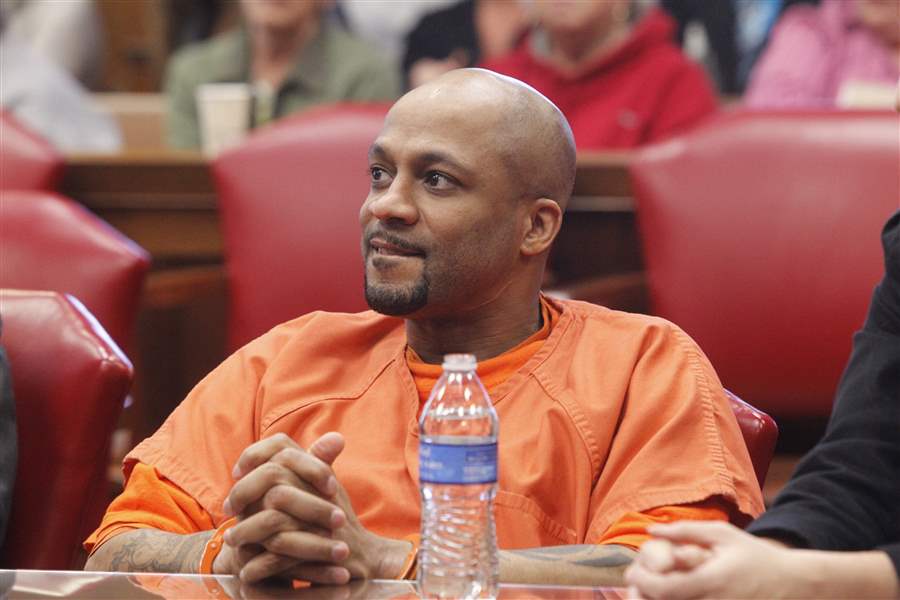
Death sentence in murders of Sandusky family upheld
2/8/2018
Curtis Clinton reacts in November, 2013, while listening to the death sentence for the murders of Heather Jackson, her 3-year-old daughter, and 20-month-old son.
The Blade/Amy E. Voigt
Buy This Image
COLUMBUS — A 46-year-old man’s convictions and death sentences for the 2012 strangulation murders of a 23-year-old Sandusky woman and her two young children were upheld Thursday by the Ohio Supreme Court.
The court rejected arguments from Curtis L. Clinton that prosecutors should not have merged trials for the strangulation murders and a separate rape of a 17-year-old girl a week earlier.
The court noted the similarities between the two cases.
RELATED: Man arrested in Sandusky slayings case • Execution ordered for murders of entire family
Clinton faces lethal injection for killing Heather Jackson and her two children, Celina, 3, and Wayne, Jr., 20 months, on Sept. 8, 2012, following a party celebrating their move into a new home.
A jury convicted him in Erie County Common Pleas Court of the three murders, the rapes of the prior victim and the 3-year-old girl, and aggravated burglary. He was sentenced to death for each of the murders, 10 years for the prior rape, life without parole for raping Celina, and 10 years for aggravated burglary.
He is incarcerated on death row at the Chillicothe Correctional Institution. He still has other avenues of appeal available to him.
DNA and other evidence from the prior rape helped connect him to the murders. The prior juvenile victim identified him as her attacker, both she and Celina had been raped, and all four of the victims had been choked.
“The rapes of the [prior rape victim] and the murder of the Jacksons occurred less than a week apart in Sandusky and involved an assailant driving a white Cadillac,” Chief Justice Maureen O’Connor wrote in a 77-page opinion. “Although the crimes differed in some respects, ‘admissibility is not adversely affected simply because the other [crimes] differed in some details.’”
Video of the Jacksons’ neighborhood from surveillance cameras at Firelands Hospital captured the white Cadillac at the Jackson home.
Clinton argued unsuccessfully that mingling two separate cases confused the jury. He also argued that the move prevented him from testifying in connection with the rape case, in which he wanted to claim the sex was consensual. He had already decided not to testify in connection with the murder case.
“We were investigating this triple homicide, and his [phone] number comes up as one of the numbers with the murder victim, Heather Jackson, shortly before the murder,” county Prosecutor Kevin Baxter said. “It was recognized, because another detective was investigating him for this other rape just days before. The cases were inextricably connected.”
He said similarities were drawn with Clinton’s prior involuntary manslaughter conviction in Wood County for the 1997 strangulation death of Misty Keckler, 18, of Fostoria. He served 13 years before being released seven months prior to the Jackson family murders.
Kimberly Rigby, supervising attorney in the Ohio Public Defender’s office and Clinton’s attorney, could not be reached for comment.
The court was unanimous in upholding the convictions, but now-resigned Justice William O’Neill cast the sole dissent when it came to upholding the death sentences. He offered no explanation beyond pointing to prior opinions in which he said Ohio’s death penalty is unconstitutional.
The court found aggravating circumstances favoring the death penalty outweighed mitigating circumstances arguing against death.
At trial, Clinton refused to allow his lawyers to formally present mitigating evidence. But his lawyers urged the high court to consider his abusive and violent childhood, his stay in a psychiatric hospital following a suicide attempt, and diagnoses of post-traumatic stress disorder, anxiety, and depression.
“We conclude that the aggravating circumstances as to each aggravated-murder count clearly outweigh the mitigating factors beyond a reasonable doubt,” Chief Justice O’Connor wrote. “With respect to Jackson’s murder, the course-of-conduct and the aggravated-murder-during-rape [related to the rape of C.J.] specifications strongly outweigh the mitigating factors.
“The three specifications that apply to C.J.’s and W.J.’s murders — course of conduct, murder during a rape, and child murder — overwhelm the mitigating factors,” she wrote, referring to the deaths of Celina and Wayne, Jr.
Contact Jim Provance at jprovance@theblade.com or 614-221-0496.